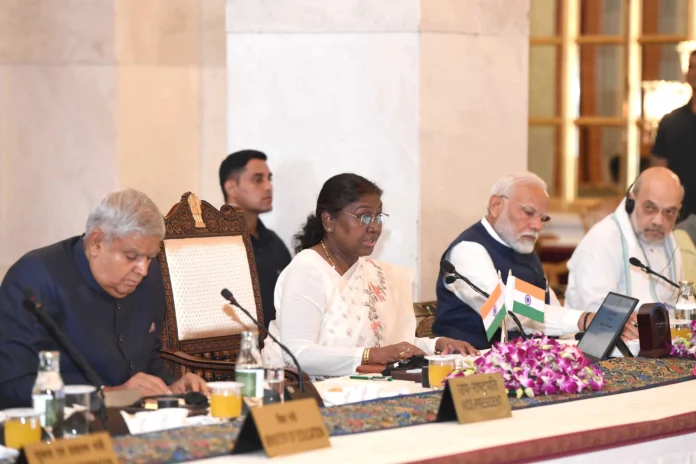The government has requested governors to enhance their social media presence, engage with the public and promptly share their perspectives, particularly in instances where there are policy disagreements between the central government and the states.
The official memorandum also encourages governors to avoid working in isolation and proposes that they assist in enhancing collaboration between various central agencies and organisations under state governments. It emphasises that such coordination would contribute to the improvement of various aspects of governance, encompassing job creation, education, skill development, service delivery and economic growth.
This was disseminated during a two-day conference chaired by President Droupadi Murmu and attended by Prime Minister Narendra Modi, various ministers and senior government officials.
The agenda note also advises governors to regularly host open forums and roundtable discussions with community leaders, visit schools and hospitals and engage directly with citizens.
Incidentally, a governor is not ordained with executive powers, except in matters related to the appointment of the chief minister, ministers and in higher education in the capacity of chancellor of state universities.
In this regard, Uttar Pradesh’s governor Anandiben Patel has played a proactive role ever since she took charge. She has inspected police stations, checked hospitals and mid-day meals in schools and called review meetings of officers of the state government. She created a flutter in Barabanki district when she exhorted girls to “hit boys with stones if they dared tease them”.
The role of governors has come under scrutiny earlier also. On November 11, 2021, President Ram Nath Kovind had exhorted governors to play the role of “friend, philosopher and guide” while inaugurating the 51st conference of governors, lieutenant governors and administrators at Rashtrapati Bhavan. He had said that governors had a very important role in creating awareness about national goals and ensuring public participation. He added that to fulfil this commitment, governors must spend as much time as possible in their state and maintain connect with the people.
During this same conference, Vice-President M Venkaiah Naidu had stressed the importance of proactive involvement by governors and lieutenant governors of states and Union Territories in overseeing the implementation of central programmes and mobilising public participation in nation-building initiatives. He had urged them to closely monitor and provide guidance for various initiatives launched by the central government, guided by the philosophy of inclusive progress and effective public engagement.
Referring to the vast experience of governors in public life, he stressed that they have an important role in shaping policies and their execution, ensuring effective utilisation of scarce resources and ensuring probity and ethics in public life. “Governors and Lt-governors should function not only as constitutional authorities, but with the moral authority of an elder statesman.”
He urged them to ensure that governance and public life was marked by strict adherence to the philosophy and provisions of the Constitution.
In the context of rising concerns over climate change and the COP-26 global meet on climate change, Naidu urged governors to promote people’s movements for climate friendly actions like tree plantation, water conservation, environment friendly construction, waste management, etc.
In the present conference, the prime minister has also emphasised that an institutionalised mechanism should be created for frequent interactions among governors to learn about the best practices in their states and emulate them in other states. He also referred to the significance of social media and technology, and said that such tools should be adopted by governors to streamline their functioning and reach out to people.
He referred to the NAMO app which carries positive news every morning in order to make them more aware of developments around the country. Asking governors to share their experiences of their state for his Mann ki Baat, he said the governor’s institution was critical in maintaining the integrity of the nation. He asked them to be cautious against any attempt to go against the spirit of the Constitution.
Following these developments, Justice BV Nagarathna said: “In today’s times, unfortunately, some of the governors in India are playing a role where they ought not to and are inactive where they ought to be.” She was delivering her closing keynote address on the topic Home in the Nation: Indian Women’s Constitutional Imaginaries at the National Law School of India University (NLSIU)-PACT conference on August 3, 2024.
She elucidated the concept of “neutrality of the governor” by citing Durgabai Deshmukh, a member of the Constituent Assembly of India. Deshmukh had stated that the position of governor was introduced into the Constitution to foster harmony and understanding among diverse groups of people. The governor’s role is envisioned to be above party politics and factions, ensuring impartiality in their duties.
—By Abhilash Singh and India Legal Bureau


